- Home
- C. Sean McGee
The Anarchist (...Or About How Everything I Own Is Covered In A Fine Red Dust)
The Anarchist (...Or About How Everything I Own Is Covered In A Fine Red Dust) Read online
A short story by c.seanmcgee
The Anarchist
…or about how everything I own is covered in a fine red dust
The Anarchist
…Or about how everything I own is covered in a fine red dust
Copyright© 2014 Cian Sean McGee
CSM Publishing
‘The Free Art Collection’
Araraquara, Brazil
First Edition
All rights reserved. No part of this book may be reproduced in any form by any electronic or mechanical means including photocopying, recording, scanning or digital information storage and retrieval without permission from the author.
Cover Design: C. Sean McGee
Interior layout: C. Sean McGee
Author Foto: Carla Raiter
This book was written under the influence of:
Edvard Grieg – Piano Concerto in A Minor: III
Chapter Zero
“To live within is to live without,” said The Teacher, moving around the classroom in slow steps, looking at the patterned tiles beneath his feet and ignoring his student’s gaping reactions, knowing that their awe was not in the definition of his words, but in the outline of his character.
“You know,” he said, “all there is to know. You’ve seen every movie, you’ve watched every documentary, you’re out there living in it god damn it” he shouted, his words, like tiny shards, spitting from his mouth and cutting through the air of professional naivety that was supposed to divide; he from his students and knowledge from the truth. “You’re swimming in it, barely keeping your heads above this dank, fetid water; this cesspool of gluttonous ambition.”
The Teacher stood like a messiah and spoke like a dictator. His every word was without hesitation; without doubt or indecision. He gripped his hands when he spoke as if he were strangling the gangly neck of the very authority he was denouncing. And though his arms were not shaped or muscular, he looked as if he were someone with whom one would not want to reckon. He looked as if, beneath his academic attire, like the young adults he was teaching, there swelled a sea of mutiny and rage, one of which might rise and swarm upon the shores of complacency at any second.
His beard was grown in. It was bushy, but it wasn’t unkempt. It looked conditioned and maintained. The young men in the class, they too wore beards, their faces like the smoothed and flattened ends of a brown bear’s arse, inspired by the man who gave them knowledge, inspiration, direction and who made them feel like they mattered.
The girls in the class, they all wanted to fuck him.
And the boys, they wanted to be him.
His name was Stephan, but that’s not important, for his students, those of whom fancied upon his every word and were bedazzled at his every conceivable idea, those of whom sat in pensive and undebatable attention and those of whom looked just like a much younger he, they referred to him by only one name, by only one title – Teacher.
“Look at the poor today. Take minimum wage for example. The average family will bring in one fiftieth of what a banker does per month. What does their salary buy them? A shitty roof over their heads in some run down, dilapidated and derelict estate. No running water, no basic sanitation, disease and violence abounding, and at the end of it, barely enough money to put rice and beans on the table. So what you’re looking at is the majority of the country, travelling long distances to get to work and then living in wretched conditions with just enough money to eat, drink and be stupefied by the news, football, soap operas and game shows. They have just enough money to survive – to keep their head above water, but not enough to make a difference – to swim back to shore. You look back over the years, say go back two hundred years or so, take inflation all the way back, and what does that work out to – that minimum wage. What does that coil back to, working and toiling unreasonable hours and living in squalid conditions with nothing but scraps of food and the hope of not being whipped, the only gift for one’s servitude?”
The students hung off his every word and he knew this, he was no amateur. The Teacher had delivered this sermon day after day, month after month and year after year; for such a long time now that he was an artist in its delivery.
“Slavery,” he said, sitting cross-legged on his desk, his hands tapping on the dirtied ends of his splitting skate shoes. “Think about it,” he said. “Slaves were given nothing but a shambled roof over their heads and scraps of food, the parts of the animals that were unfit for consumption. Slavery still exists. Don’t fool yourselves. The poor, none of them can change their conditions. You don’t think a maggot might prefer a slice of ham as opposed to a heap of steaming shit?”
The class all erupted in laughter, decadent laughter.
“But what do we do? What can we do?” asked one student, looking despondent. “It just seems like there’s so much happening, there are so many problems conflicting, and I don’t know what to do. It’s like, so much shit has been thrown on my lap and I can’t make out one from the bloody other. I mean, I believe in change, I do, that’s why I’m here. I believe we can make a difference, that we can fix our mother’s and father’s wrongs. I believe this, I do. But there’s so much shit and it’s like the news and the documentaries and the magazines and those political parody shows, the ones you told us to watch, they have a new problem every segment and they don’t sit still on one for long enough for me to figure out what the hell is going on, and I never know what I’m supposed to do, and I just feel dizzy and inutile, you know?”
The class all turned to the student. Though they might have felt this way – dizzy and distorted, none would ever admit it, not in this capitulated manner, not to themselves and not to their class – their comrades. And the looks they all wore, like patches and emblems sewn onto their sleeves, they said “Cast him out,” as if the student’s weakness and indecision might spread and infect and then beget their own.
“You have to believe that we can make a difference” said one boy, Alexander, a handsome young man, muscular and well liked, even outside of his socialist circles with his beard, much longer than the others, nearing on hipster, yet not so much that it might deride his political and philosophical musings.
As he spoke, the girl beside him touched his leg and she looked at him smiling before they both turned to The Teacher, hoping that he would agree and maybe even nod his head or gesture with his hands. The Teacher, though, he was staring at a scuff mark on his shoe.
“It’s not enough though that you believe in change, that you believe in making a difference, in making change happen,” The Teacher said. “It’s not enough” he shouted, looking up to confront the wave of doubt that was trickling up the class’ collective conscious shore.
“You think it makes a difference sitting on your computer,” he said. “And clicking like on something, agreeing with each other all the time? You really think that’s gonna change anything, sitting around the campus, talking about what’s right or wrong? Our government is filling their pockets on our disparity. They’re putting the interests of big business before what’s important – health and education. They say the middle class is growing. I say they’ve lowered the belt down around this country’s fucking ankles. Everyone is middle class now. They’re lowering the standards; they’re changing the fucking definitions. As for the people, we can’t expect them to react. They’re caged by freedom; like fucking cows in a paddock. Give them the right to speak and they say nothing. Tear down the fences, give them an open paddock and guess what, they stay right where they fucking are. They have their football, social security,
and shopping malls. It’s not their fault, but we can’t count on them. They have their bread and circus; they can live with their drunken, cynical, sniping rhetoric. It’s up to us. It’s up to you; the young, the passionate, the learned, the brave, the future. You have to act. You have to do something. You have to make change happen. Look at Egypt, look at Turkey, and look at Syria. We’re no different. We’re all the same. We’re all being dictated. We’re all being oppressed. This is our Arab Spring. This is our revolution” The Teacher said, as the room erupted with the sound of jeering, fists beating against tables and high fives being slapped in concording celebration.
“I have a Turkish friend,” said one student, to the applause and awe of the others.
“Free the pyramids,” said another.
“Free the pyramids” they all shouted, hitting their clenched fists on their desks.
“Quiet down,” said The Teacher, like a maestro, preceding the diminuendo with his slowly fanning hands. “Tell me, what made those great revolutions what they were? What turned them from merely objectionable protests and learned shouting into an undamming uprising? Was it the message?” he asked, looking around the room. “No,” he said. “Their message was as old as their whipping hands. If not, what then?” The Teacher asked, looking stumped before slowly grazing the room with a cunning look that hinted that he in fact knew, on which side of the fence, the grass was indeed greener.
“It was the sheer number of people” said one of the students, Suha, a pretty girl with black, straw-like hair and a usually mousey type demeanor; a normally impish girl whose waspish voice might have, on any other day, gone unheard and unaffected, lost in the furious buzzing of maniacal ranting of youthful and bearded Gueverian men, and their demure yet callous and officious Beauvoirian compeers.
“That” she said, “and their absolute defiance, laying themselves before the smiting hand, not just for a cause, but because hundreds of thousands were doing so too and millions were watching at home on their televisions, watching innocent people being slaughtered by brutal police and watching still, more and more people coming. That’s what drove them, watching more and more spilling onto the street. They wanted to be there too. They wanted to be amidst the furor, amidst the tide of change that from their television sets, looked colossal and spectacular. They wanted to be amidst the many hundreds of thousands. But here, the people, they have no passion. They have no objection. They won’t move, not for just any kind of voice or violence. There has to be a specific kind of catalyst” she said, her voice barely understandable amidst the constant ringing in one’s ears and their own thoughts, barely giving them a chance to listen, already delivering, on their conscious podium, their next savvy yet proscribing, socialized rhetoric.
The class all turned, not because they were baited to her dainty hook, but because their appetent, pupated stares were anchored to the hull of The Teacher’s listing expression, almost capsizing in heeling canine confusion.
“What do you propose?” asked The Teacher. “What do you think will ignite the placated embers of rebellion in millions of people around the country? What is the catalyst?”
“There needs to be a victim,” said Suha. “At the hands of authority. It should be a girl. She needs to be innocuous, someone that the average person can either aspire to, relate to or imagine their own child being. She has to be articulate and educated. You have to be able to think this, just by looking at her, even if you have to squint to make out the grainy photo on the front of a newspaper. She should be white, her eye color is not important but if possible, any color other than brown. Her hair should be tied in a ponytail and she should be attenuated and slender; not bulky, ferine or offensive. Most of all, she should be pretty but not sexual, not like a whore. She should look ordinary, but unmistakably pretty.”
The Teacher followed her idea with a salivating lacquer as if she were undressing.
“She will be the siren that calls to the gallant cavalier in every man. And to the mothers and fathers, those who dress their children - like a stranger’s face upon their partner’s aging naked body - in the fleeceable aspirations and illusory fears in which they imagine, and to the brothers and sisters and their best friends forever, she should be white enough, she should be learned enough, she should be slender enough, she should be pretty enough, so that they can imagine her as being someone they know, someone they can reach out and touch, someone they love and more so, someone who could be just like them. And her wounds, they should be horrible enough to turn one’s stomach and to almost make one wretch, but not so much that they can’t look back, time and time again. A rubber bullet to the eye should be effective.”
“That’s a bit extreme don’t you think?” asked The Teacher, staring at the girl as if he had, only now, for the first time, noticed that she even existed, as if the brevity and vehemence in her words and the celerity in which she spoke, cast off, like layers of drab clothing, her once apparent shroud of platitude, leaving nothing but the curve and round of her intellect, as delectable and delusive as he now imagined would be, her writhing, naked body.
“You want an uprising?” Suha said, “Then you need to find a pretty white girl and you need to make her cry.”
“Wow,” said The Teacher. “Now I’m not here to say what is right or wrong. That’s your judgment. But that, well… What was your name?”
“Suha,” she said.
“Suha,” he said as if he were working his tongue around an oddly shaped candy. “I think Suha here hit on something primitive. Often than not, it is not the meaning of our words but the nerve in which they twitch that inspires action. After-all, we see noble and heartfelt agencies, NGOs, using images of starving and in some cases, bullet-ridden children, to guilt you into donating to their establishments and though their ends might justify their means, their means are thought out, edited and over produced to pull at the heartstrings of anybody with a moral slate and a mere teaspoon of empathy in their souls. So why not? Why not, for the justified end, do what must be done, for the right, for the cause, for freedom and liberty? But who would do such a thing? Who would put themselves in such harm? Who amongst you then, would be the heroine?”
The Teacher looked around the room and his proving stare stopped at each girl. And each girl looked back into his eyes and one and all, they would all have surely loved to raise their hands and shout out ‘me’, being swept up into his arms and whisked around the room like some princess bride, wanting nothing but their crown of adulation from their peers and from their teacher, the handsome man whose intellect and sharpened wit, wetted their lips and had them, in their daydreaming, abandoning their pedantic profession and retiring to a cliché of desire, want and affection.
They would all have loved to, but only one did.
“Arabella,” said The Teacher, simpering beneath his prickly beard. “Very much becoming a woman.”
“I’m not frightened,” Arabella said, finally stepping out of Alexander’s shadow.
“I’m sure you’re not,” said The Teacher.
The awkward stare between the two meant they weren’t talking about the march.
And the rest of the class could feel it too.
“I said she can’t look like a whore,” said Suha to herself, but it was as if she hadn’t spoken, as if she once again sank back into the swell of youthful rebellion, vanishing, like sugar in water, with one stir of The Teacher’s potent address.
“We need to be seen,” said The Teacher, now covering his crotch. “We need to be heard. And the only way we can be seen is to tear down the establishment, that which blankets our faces; muffling our screams and keeping us, like a squawking parrot, thinking it’s night and lulled into a fabricated sense of calm and quietude – stupefied and pinioned, unwilling to ruffle our own feathers. The only way we can be heard is by shouting our sedition, above the sirens, and louder and with more authority than the referees whistle. The only way we can make a change is to make a difference. And the only way we can make a differen
ce is to scrape and scratch at the coffin in which we’re immured; to break down the walls of establishment – of banks, of corporations and government. The only hope we have is to burn everything to the ground, like a forest fire, and enrich the soil of humanity with our hope and our reverence and our fighting spirit, so that the seeds we plant may grow into a government and a society that is fair and just for one and for all, not just the descendants of degeneracy; those merchants of maligned misery” he cursed, his face now red with pained expression.
“Fuck those fascist pigs” shouted one of the boys, Alexander.
“God damn corporations,” said a girl.
“Fascist pigs,” said, Alexander again.
“But what is the solution,” asked Suha. “What can we do? Together, what can we do?”
The Teacher looked artless and unscripted.
Suha, she looked desperate, her eyes and ears and hands and heart ready and willing and wanting so badly, for some kind of a cure to this madness, to the absurdity of this inhuman society.
“Anarchy” shouted The Teacher. “Anarchy is the only solution.”
Around the class, eyes widened, mouths salivated and veins bulged with hot throbbing blood. It was as if a large clump of bloodied and rotting meat had been lumped before this pack of ravenous and bloodthirsty idealists, now feverish and rabid, famished from having starved themselves for so long on moderate theoretical debate.
“Anarchy should be our profession,” said The Teacher. “We need to cut off the diseased and infected flower, cut its head right off, so we can put in a more just, a more favorable government. We need to cut away the vines of corporate governance that like weeds, are winding their way around our lives, sapping every inch of our precious lives. If all that is left, after all these years, is a garden of weeds, then let us tear it apart and let us dig at and turn over the soil and uproot the system so that we can plant a more prestigious seed, so that we can cultivate and foster a just and fair world for every person everywhere, regardless of their color, their class or their beliefs. We need a better world, where everyone is equal, where there is no indifference. Where there is no leader or director or administrator, making unfavorable decisions, sanctioned by violent thugs with uniforms and badges. Where there are no banks, crippling families with debt in favor of a consumerist circus, ensnaring and then stealing children’s imagination and creativity and then enslaving families to endless and needless desperation and then guilt and foreboding, should they forget their binds and have their child ridiculed for being shy of their accessory bondage; mocked and laughed at by their friends. We need to wipe the slate clean. We need an earthquake. We need a tidal wave. We need anarchy.”
“Anarchy” shouted one of the students.
“Yeah, anarchy” shouted another.
“Anarchy, anarchy, anarchy” they shouted, like baying hounds, riled by the scent of a bitch’s heat or a freshly rotting carcass.
The majority of them, during the lecture, had been doodling, following The Teacher’s every word, but doodling none the less. And most of them had filled their workbooks with scrawling insignia; the letter ‘A’ encircled and scratched on every page and on some, having cut through the paper with insurgent, youthful intent.
“Who is going to the protest tonight downtown?” The Teacher asked.
Every hand rose.
“Will you be there Teacher?” asked one of the boys.
The boys stared in passion.
The girls with desire.
“Yes,” said The Teacher. “I will be marching.”
The class erupted once more.
“And I hope to see you all there. And if one or two of you, or all of you” he said, looking at each student smiling, “If you’re faces are covered and if your hearts are bare, if there’s blood on your hands by the end of the night, you’ll get credit marks, on your final assessment. And if you have a Turkish or Syrian friend, we need all the help we can get.”
The class all turned to one another, smiling and adulating.
“Remember,” said The Teacher, “for the world to follow, someone first needs to act. Someone needs to be brave enough to step onto the line. You need to prove the police as being brutes. And they are. We know that. So provoke them, make them strike at you and when they do, you strike back. You strike with the weight of your conviction and the support and belief of an entire city behind you. This protest, it’s not just about free bus fare, it’s about our right to be human; to be brothers and sisters and lovers in arms. It’s about freedom, the right to pick and choose your own destination and the right to go about it. It’s your right to exist as you see fit. Tear down the system. Fuck the police. Scare the government. You go out there and you show them that you’re young and brave and that your life matters. Let’s tear down the fucking walls and start again” shouted The Teacher as the bell sounded, the class spilling out into the foyer like water from a broken mane.

 Coffee and Sugar
Coffee and Sugar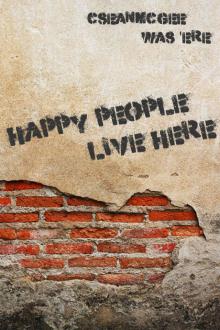 Happy People Live Here
Happy People Live Here_preview.jpg) Alex and The Gruff (A Tale of Horror)
Alex and The Gruff (A Tale of Horror)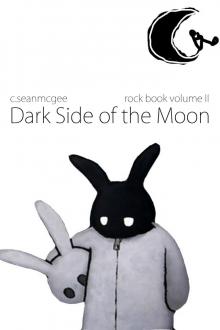 Dark Side of the Moon
Dark Side of the Moon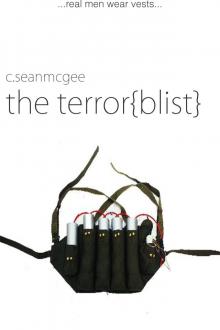 The Terror{blist}
The Terror{blist}_preview.jpg) The Anarchist (...Or About How Everything I Own Is Covered In A Fine Red Dust)
The Anarchist (...Or About How Everything I Own Is Covered In A Fine Red Dust)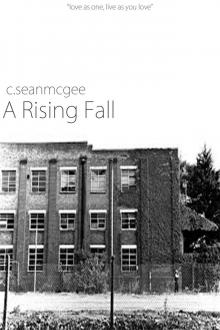 A Rising Fall
A Rising Fall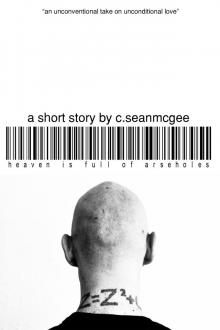 Heaven is Full of Arseholes
Heaven is Full of Arseholes Utopian Circus
Utopian Circus![[2014] The Time Traveler's Wife Read online](http://i1.bookreadfree.com/i/03/24/2014_the_time_travelers_wife_preview.jpg) [2014] The Time Traveler's Wife
[2014] The Time Traveler's Wife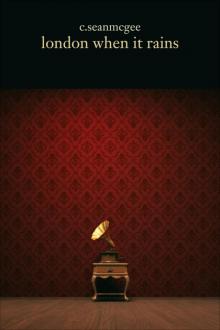 London When it Rains
London When it Rains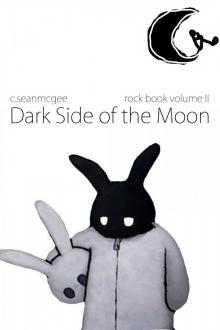 Dark Side of the Moon by C. Sean McGee
Dark Side of the Moon by C. Sean McGee![The Terror[blist] Read online](http://i1.bookreadfree.com/i2/04/06/the_terrorblist_preview.jpg) The Terror[blist]
The Terror[blist]